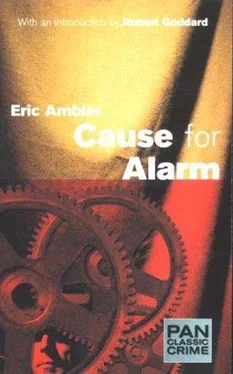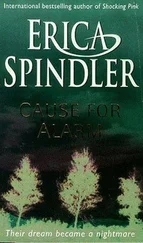Eric Ambler - Cause for Alarm
Здесь есть возможность читать онлайн «Eric Ambler - Cause for Alarm» весь текст электронной книги совершенно бесплатно (целиком полную версию без сокращений). В некоторых случаях можно слушать аудио, скачать через торрент в формате fb2 и присутствует краткое содержание. Жанр: Криминальный детектив, на английском языке. Описание произведения, (предисловие) а так же отзывы посетителей доступны на портале библиотеки ЛибКат.
- Название:Cause for Alarm
- Автор:
- Жанр:
- Год:неизвестен
- ISBN:нет данных
- Рейтинг книги:3 / 5. Голосов: 1
-
Избранное:Добавить в избранное
- Отзывы:
-
Ваша оценка:
- 60
- 1
- 2
- 3
- 4
- 5
Cause for Alarm: краткое содержание, описание и аннотация
Предлагаем к чтению аннотацию, описание, краткое содержание или предисловие (зависит от того, что написал сам автор книги «Cause for Alarm»). Если вы не нашли необходимую информацию о книге — напишите в комментариях, мы постараемся отыскать её.
Cause for Alarm — читать онлайн бесплатно полную книгу (весь текст) целиком
Ниже представлен текст книги, разбитый по страницам. Система сохранения места последней прочитанной страницы, позволяет с удобством читать онлайн бесплатно книгу «Cause for Alarm», без необходимости каждый раз заново искать на чём Вы остановились. Поставьте закладку, и сможете в любой момент перейти на страницу, на которой закончили чтение.
Интервал:
Закладка:
“I suppose so.”
But it was two o’clock before we reached the road. It might have been an oasis in a desert instead of a dry strip of dusty flints. Zaleshoff uttered a husky exclamation of satisfaction.
“I knew we weren’t far away. Now you get among those bushes and lie low while I see what I can find in the shape of a drink. Don’t move away.”
The exhortation was unnecessary. Nothing but the direst necessity could have induced me to move. Through the pumping of the blood in my head I heard Zaleshoff’s footsteps crunch slowly away into the distance.
Looking back now on those days with Zaleshoff one thing makes me marvel above all else-my complete and unquestioning belief in Zaleshoff’s superior powers of endurance. It was always Zaleshoff who coaxed me into making a further effort when no further effort seemed possible. It was always Zaleshoff who, when we were both at the end of our strength, would walk another kilometre or more to get food and drink for us both. That it was safer for Zaleshoff to do so was beside the point; and, in any case, it soon became as dangerous for Zaleshoff as it would have been for me. My acceptance of the situation was based on the tacit assumption that Zaleshoff would naturally be in better shape than me. It is only now that I realise that Zaleshoff’s was not physical superiority, but moral. I remember now, with a pang of mingled conscience and affection, the grey look of his face when he was tired, his habit of drawing the back of his hand across his eyes and one little incident that happened later. He had stopped suddenly to lean against a tree. With weary irritation I had asked him what the matter was. His eyes were shut. I remember now seeing the muscles of his face tighten suddenly. Then he looked angry and said that he had a stone down the inside of one of his boots. That had been all. He had pretended to extricate the stone and we had walked on. No, you could not dislike Zaleshoff.
I was nearly asleep when he got back. He shook me. I looked up and saw his face near mine. The sweat was trickling down in rivers through the dust and grime on his unshaven cheeks.
“Something to drink and eat,” he said.
He had bought some bread and sausage and a bottle of water mixed with a little wine from a woman in a cottage about a quarter of a mile away. Her husband had been at work in the fields. He had seen nobody else but the driver of a passing lorry.
“I’d have preferred plain water myself,” he added; “but she said it was safer with a little wine in it. I didn’t argue the toss about it. We don’t want to add stomach trouble to the rest of it.”
I was feeling too tired to eat much. When we had finished, we put what was left in our pockets, together with the now half-empty bottle, smoked one cigarette each and set off again.
The afternoon was worse, if anything, than the morning. It was the first really hot day I had known in Italy. We marched with our overcoats and jackets slung over our shoulders. The flies pestered us almost beyond endurance. Twice we had to make wide semicircular detours over rough ground to avoid being seen by labourers. We crossed another secondary road. Towards four o’clock Zaleshoff called a halt.
“If we go on like this,” he panted, “we shall kill ourselves. We can’t be so very far from the railway now. For God’s sake let’s have a drink and wait for the sun to cool off a bit.”
For an hour we rested in the shade of a tree, talking inanities to prevent ourselves going to sleep. When we got to our feet again the sun had started to dip down towards the trees on the western horizon. The flies seemed less attentive. Zaleshoff suggested singing as we went to keep a good marching rhythm. At first I was inclined to regard the proposal as a piece of very shallow heartiness, but to my surprise I found that the dingy humming that we managed to produce cheered me considerably. My legs seemed to be moving automatically as though they did not belong to me. All I could feel of them was the aching thigh muscles and the burning soles of my feet. We began to descend a long gentle gradient.
It was about half-past six that we heard the train whistle.
Zaleshoff gasped out an exclamation. “You heard it, Marlow? You heard it?”
“It sounded a darn long way away.”
“Electric train whistles always do. Another couple of kilometres and we’ll have done it.”
Twenty minutes later we crossed our third road. It was a little wider than the others and we had to wait for a private car and a van to pass before we broke cover and crossed.
The way now was more difficult. Before, we had been traversing open country partly under cultivation, with only an occasional hedge or low stone wall to mark property boundaries. Towards the railway the properties were smaller and sometimes fenced with wire. We passed at no great distance a fair-sized factory with two tall metal chimneys. Then, as we breasted a low slope, Zaleshoff pointed to what looked like a thin strip of grey cloud right down on the horizon ahead of us and said that it was the hills above Bergamo. Not long after we saw the railway line.
It emerged from a cutting about a quarter of a mile away below us. For some reason, the sight of it depressed me. We had arrived; but the worst lay ahead of us. The curving rails looked extraordinarily inhospitable.
“Well, what now?” I said helplessly.
“Now, we wait until it’s dark.”
We found a hollow screened by grass and piles of brown stones near the cutting and finished the remains of the food we had with us. We washed it down with some cognac. My eyes burned and stung and were half-closed, but I felt suddenly very wide awake.
“We’d better put our coats and scarves on,” said Zaleshoff: “it’ll be cold soon.”
We lay there in silence watching the sun grow and redden as it sank into the streaky blue-black clouds that seemed waiting to receive it. The light faded. When it was nearly dark we left our hiding-place, moved down near to the line and began to walk in a direction parallel to it away from the cutting. By the time we saw the lights of a station it was quite dark.
We approached the station slowly. It was very small. In common with most small Italian country stations there were no platforms, only the white stuccoed station buildings, the neat wood fences, and the clipped hedges. Beyond it was a level crossing and a signal cabin. An electric floodlight suspended from a tall concrete standard cast a circular pool of light in front of the station house. Standing talking in the light were two men. One was a station official. The other was a Fascist militiaman with a rifle slung across his back.
“What’s the one with the rifle doing there?” I whispered stupidly.
“What do you think?” retorted Zaleshoff. “The siding’s over the other side. We’ll go back and cross the line a bit lower down.”
We groped our way back along the wire fence that bounded the track, then dived under it and scuttled across the rails. On the far side we remained on the track side of the fence and began slowly to work our way back towards the station.
The track level was only about a couple of feet above that of the surrounding land and we had practically to crawl along on our hands and knees to keep under cover. Then the fence curved away to the left and I saw ahead the bulky outlines of tarpaulined goods trucks. A moment or two later we were able to stand upright with the trucks between us and the station house.
There were about twenty trucks in the siding and all appeared to be loaded. We walked alongside them until we reached the buffers at the end. Then Zaleshoff stopped.
“This looks like us,” he whispered. “All loaded and ready to go. Probably parked here last night. Come on.”
He led the way back a little, then stopped again.
Читать дальшеИнтервал:
Закладка:
Похожие книги на «Cause for Alarm»
Представляем Вашему вниманию похожие книги на «Cause for Alarm» списком для выбора. Мы отобрали схожую по названию и смыслу литературу в надежде предоставить читателям больше вариантов отыскать новые, интересные, ещё непрочитанные произведения.
Обсуждение, отзывы о книге «Cause for Alarm» и просто собственные мнения читателей. Оставьте ваши комментарии, напишите, что Вы думаете о произведении, его смысле или главных героях. Укажите что конкретно понравилось, а что нет, и почему Вы так считаете.












